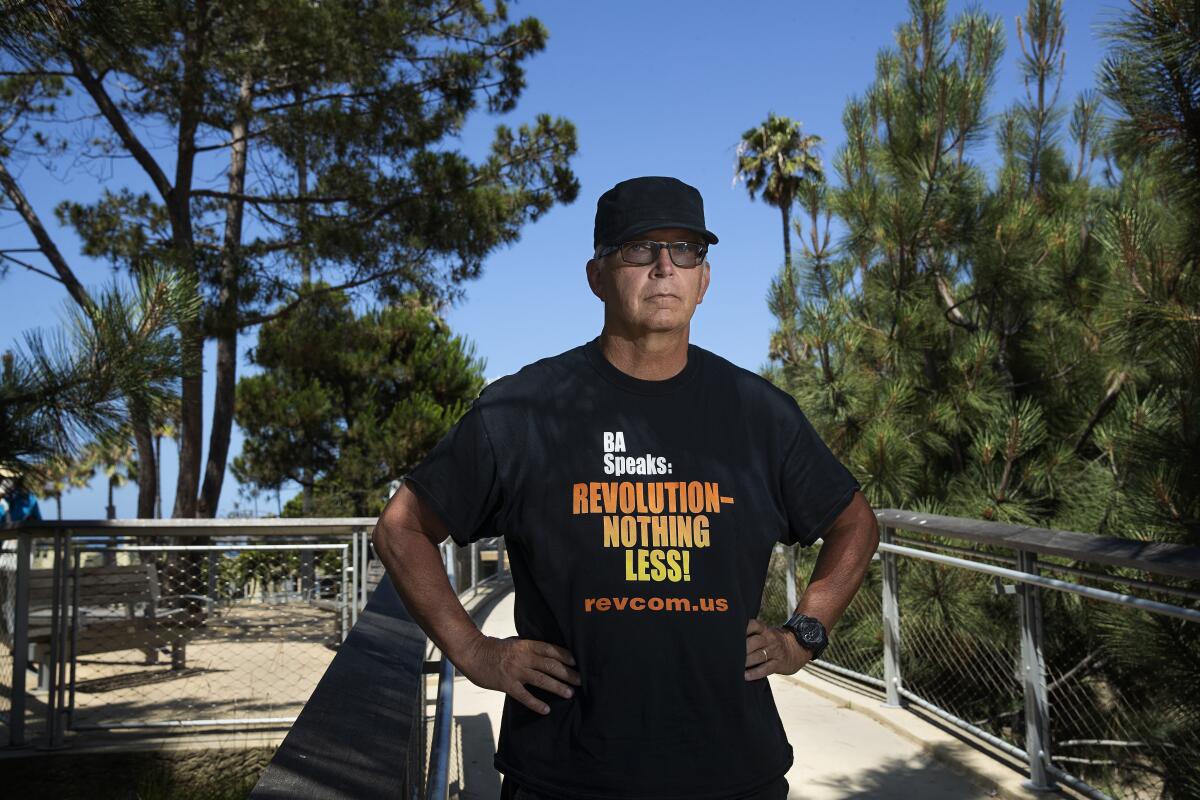Column: Meet the man who made it legal to burn the American flag

Gregory “Joey” Johnson is not willing to say where he will be on July 4 — “It’s a big country, so who knows?” — but he will definitely be somewhere in the public square, advocating an end to white supremacy, institutionalized racism and police brutality.
In all likelihood, he will also burn an American flag.
Last week, after I wrote about President Trump’s cynical demand to outlaw flag burning, Johnson got in touch. Would I be interested in talking to him? He was the defendant in the landmark 1989 Supreme Court case, Texas vs. Johnson, in which the court ruled that burning an American flag, however odious or offensive, is a constitutionally protected form of speech.
On Monday morning, we met in Santa Monica’s Tongva Park, in masks, to talk about his role in the famous case.
Actually, that’s what I wanted to talk about.
Johnson, 63, was more interested in talking about politics and revolution.
He is a committed member of the Revolutionary Communist Party, founded in 1975 by Bob Avakian, the group’s 77-year-old chairman and theoretician.
The party, which is organized in “Revolution Clubs,” is dedicated to replacing our system of capitalism, patriarchy, exploitation, imperialism and environmental devastation with … something better. It’s hard for me to understand, exactly, especially since the party condemns voting. (“If you want to see NO fundamental change,” wrote Avakian last month, “go vote.”)
Johnson is encouraged by the protests that have swept across the globe, sparked by the killing of George Floyd in Minneapolis. That horrendous nine-minute video has done more to radicalize the masses than a million lectures or pamphlets ever could.
“People are calling into question, in the millions and tens of millions, white supremacy and how rooted it is in the fabric of this society,” said Johnson. “How do we get beyond it? How can we live in a world without this horrific oppression of Black people?”
He sent me a flyer for an Independence Day rally and march in Hollywood, sponsored by the local Revolution Club, though he wouldn’t confirm that he’ll be there.
“This July 4th,” it said, “Demonstrate how to Dishonor the American Flag.”
If you plan to burn a flag, by the way, it’s strictly BYO.
::
Johnson was an Army brat who grew up in Germany and across the South.
In 1969, when he was 12 years old, he sold the Stars and Stripes newspaper to soldiers on a U.S. Army base in Babenhausen, Germany. That, he says, was the start of his political awakening.
“We used to talk a lot about the [Vietnam] war and their sentiments,” he said. “There was a lot of ‘I don’t want anything to do with it.’ They were counting down the days they had left in the military. Some Black soldiers had Afro picks with the Black fist, he remembered. Lieutenants would cut off the fist part and hand it back to them.”
Back in the States, in 10th grade, he discovered a copy of “Soledad Brother: The Prison Letters of George Jackson.”
“It kinda blew my mind, because I was living in the South and all you heard about was Martin Luther King,” said Johnson. “And these people — the [Black] Panthers — were all about revolution.”
He spent some time at the University of South Florida in Tampa and joined the Merchant Marine to pay for health insurance for his mother, who was ill.
While working on ships between Florida and the Mississippi, he saw what he called “the apartheid-like stratification of the labor force.”
A few years later, in 1984, President Reagan was about to be nominated for a second term at the Republican National Convention in Dallas. By then, Johnson, who was 27 years old, was a committed revolutionary.
“Reagan was backing all these death squads in El Salvador, Guatemala, Honduras. People want to know the antecedents: How did we get to where millions of people in Central America have to flee their homelands and come here for a better life? Avakian says, ‘I’ll tell you why: It’s because you [messed] up the rest of the world gaining your riches and glory.’”
In Dallas, Johnson said, he was blown away by the jingoistic atmosphere: the patriotic themes, the slogans, the abundant American flags.
There was, he felt, “a need to puncture that.”
Burning the flag, however, was a spontaneous act of protest. At the time, no one could have grasped the historic ramifications of his deliberate act of provocation.
Johnson was among nearly 100 people arrested for desecrating the flag. But he was the only one who returned to Dallas for trial.
“I thought it was important to fight it,” Johnson told me. The ACLU took his case. He was convicted, then won on appeal. Texas, however, appealed the case to the high court. Johnson sent a plea by telegram to William Kunstler, a famous radical attorney, who agreed to argue his case before the Supreme Court.
In the years since, Johnson has been arrested countless times for exercising his legal right to burn the flag. “I’ve spent lots of time in county jails all over the country,” he said.
In 2016, at the Republican National Convention in Cleveland, he announced in a press release that he’d be burning a flag, and was arrested anyway, though not before he accomplished the deed.
“Oh, yeah, it burned,” he said. “Well done.”
After charges were dropped, he filed a civil lawsuit against the city of Cleveland for violating his free speech rights and won $225,000.
::
So, how, exactly, does one go about burning a flag? I mean, it seems like a fairly dangerous way to make a point.
Johnson considered the question.
“You have to burn the flag in a controlled and responsible way,” he said. “You do your preparation, and do your best.”
Preparation? I asked.
He hesitated.
“One must properly season the flag,” Johnson said. “With the right amount of lighter fluid.”
It’s a recipe that tests the limits of free speech.
Not to everyone’s taste, of course.
But that, you might say, is the whole point.
@AbcarianLAT
More to Read
A cure for the common opinion
Get thought-provoking perspectives with our weekly newsletter.
You may occasionally receive promotional content from the Los Angeles Times.











